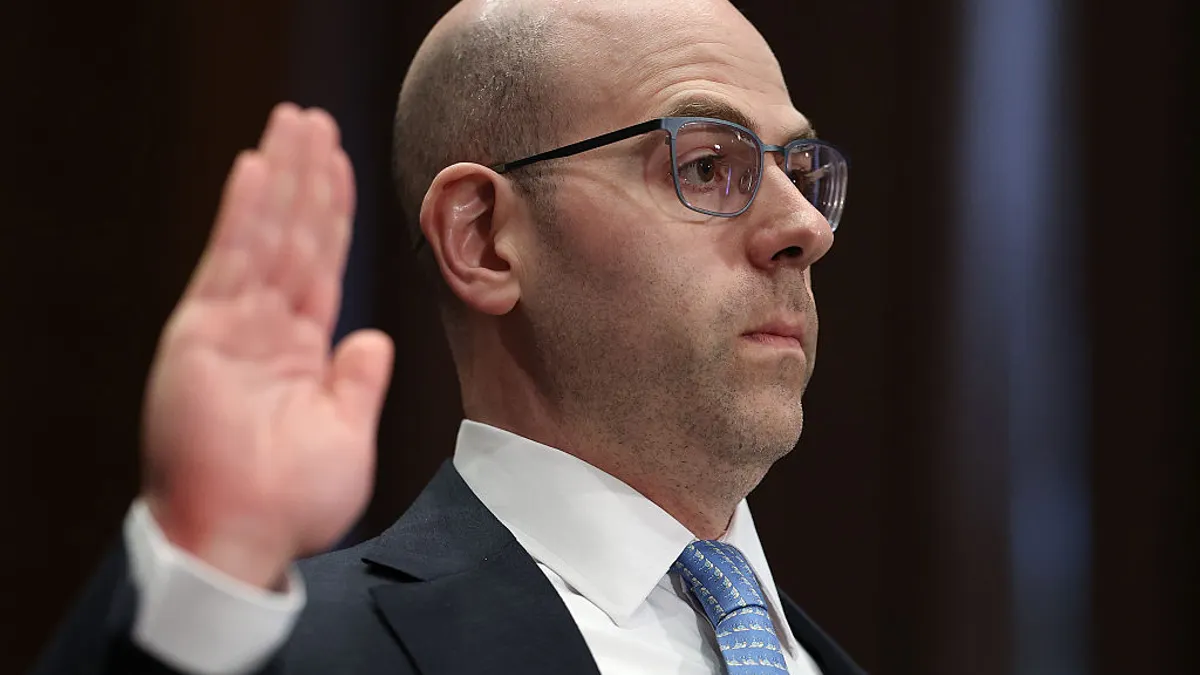Dive Brief:
- Federal Reserve Governor Stephen Miran on Monday dismissed the risk of tariff-induced inflation and called for two, half-percentage-point cuts to the main interest rate next quarter to avert higher unemployment.
- Tariff revenues, tax policy and a crackdown on immigration have likely reduced the so-called neutral rate of interest — or the level that neither spurs nor slows the economy — below estimates by other Fed officials, clearing the way for rapid monetary easing, Miran said.
- “The upshot is that monetary policy is well into restrictive territory,” Miran said in a speech to the Economic Club of New York. “Leaving short-term interest rates roughly 2 percentage points too tight risks unnecessary layoffs and higher unemployment.”
Dive Insight:
Miran voted against a decision by other policymakers on Wednesday to trim the benchmark interest rate by a quarter point to a range between 4% and 4.25%, favoring a half-point reduction instead.
The majority of Fed officials — while also citing weakness in the job market — overestimate the risk of inflation, especially the role of tariffs in increasing price pressures, Miran said.
“Relatively small changes in some goods prices have led to what I view as unreasonable levels of concern,” he said.
Instead, import taxes will reduce the federal budget deficit, slowing government borrowing and easing upward pressure on interest rates, Miran predicted. He said the Congressional Budget Office estimates that tariff revenue may annually reduce the budget deficit by more than $380 billion during the next decade.
The monetary policy debate that provoked Miran’s dissent last week spilled into the public arena on Monday as St. Louis Fed President Alberto Musalem said he sees limited leeway for more monetary easing.
“I supported the 25-basis-point reduction in the FOMC’s policy rate last week as a precautionary move intended to support the labor market at full employment and against further weakening,” Musalem said in a speech at the Brookings Institution.
“However, I believe there is limited room for easing further without policy becoming overly accommodative,” he said.
A record stock market, low credit spreads and healthy bank lending provide ample fuel to economic growth, Musalem said.
Also, policymakers should not lose sight of their goal to push down inflation, which may persist above the central bank’s 2% target because of tariffs or slower growth in labor supply, he said.
Still, “should further signs of labor market weakness emerge, I would support additional reductions in the policy rate, provided the risk of above-target inflation persistence has not increased and longer-term inflation expectations remain anchored,” Musalem said.
Miran brushed aside concerns that his decision not to resign as the top economic advisor to President Donald Trump will weaken the independence of the Fed from political pressure. Instead, Miran has taken an unpaid leave of absence until his term at the central bank expires in January.
Trump for months has called on Fed Chair Jerome Powell to reduce borrowing costs to spur economic growth and lower the cost of servicing the federal debt. He has repeatedly disparaged Fed Chair Jerome Powell as incompetent for not slashing the benchmark interest rate by more than 3 percentage points.
Miran said in response to a question that Trump has not tried to shape his approach to monetary policy, and that he would resign from his White House post if he were to serve at the Fed beyond January.
Miran will dissent again if he sees it as necessary, he said. “I'm not going to vote for something I don't believe in, just for the sake of creating an illusion of consensus where there is none.”
















